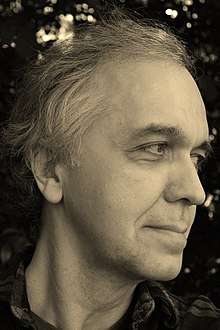Igor Vishnevetsky
| Igor Vishnevetsky | |
|---|---|
 | |
| Native name | Игорь Георгиевич Вишневецкий |
| Born |
Igor Georgievich Vishnevetsky 5 January 1964 Rostov-on-Don, USSR |
| Alma mater |
Moscow State University Brown University |
| Occupation | Poet, novelist, scholar, filmmaker, educator |
| Children | Ignatiy Vishnevetsky |
Igor Georgievich Vishnevetsky (Russian: Игорь Георгиевич Вишневецкий; born 5 January 1964)[1] is a Russian-born poet, novelist, screenwriter, and editor. He has been a contributor and editor in numerous literary journals, anthologies, and scholarly periodicals since the 1980s. Some of his work has been published in English, including a translated version of his first novel, Leningrad (2010).
Biography
Igor Vishnevetsky was born in Rostov-on-Don in 1964 to Georgiy and Alla Vishnevetsky. Vishnevetsky originally aspired to become a composer. He studied piano performance in school and audited music theory courses at Rostov State Rachmaninoff Conservatory before attending Moscow State University to pursue a degree in philology. After graduating in 1986, Vishnevetsky became an active member of the poetry and art scenes in Moscow and St. Petersburg prior to the break-up of the Soviet Union.
Vishnevetsky emigrated to the United States in 1992. Since that time his creative work has been done chiefly in North America.
In 1996 he received a Ph.D. in Russian Literature from the Department of Slavic Languages of Brown University. Subsequently, he taught at Emory University for five years. In the 2000s, he has also become a notable music historian, and is considered an authority on Sergei Prokofiev and the Russian-American composer Vladimir Dukelsky.
He also was a visiting professor of Russian and Film at Carnegie Mellon University. It was in Pittsburgh where he composed his experimental novel Leningrad which describes the dehumanizing effects of the Finno-German siege of the city during World War II and deals with transformation of former Russian capital into a Soviet city. Praised for its insights into the minds of the people who experienced the collapse of everything associated with humanity, Leningrad won a 2010 award for the best fiction published in Russia's leading literary periodical Novyi mir. In 2012 it won a prestigious "New Verbal Art (Novaya Slovesnost', or NoS)" literary award.
Since 2010 he had been working on a film version of Leningrad.[2][3] The film was completed in 2014 (a slightly shorter version in 2015) and received a number of awards.[4][5] Film historian and critic Andrei Plakhov called it "an absolutely amazing experiment,",[6] while film critic Evgeny Maisel considered Visnevetsky's film "a true challenge to contemporary professional film production."[7]
His son is film critic Ignatiy Vishnevetsky.
Bibliography
Collected Poetry
- Стихотворения - Poems (1992)
- Тройное зрение - Threefold Vision (1997)
- Воздушная почта: Стихи 1996—2001 - Air Mail: Poems 1996-2001 (2001)
- На запад солнца - West of the Sun (2006)
- Первоснежье - First Snow (2008)
- Стихослов - Rhymologion (2008)
Fiction
- Ленинград - Leningrad (2010)
- Острова в лагуне - Islands in the Lagoon (2013)
- Неизбирательное сродство - Non-Elective Affinities (2017)
Translated Fiction
- Leningrad (in English, 2013)
- Leningrad (in Macedonian, 2014)
Academic Works
- Трагический субъект в действии: Андрей Белый - Tragic Subject and Action: Andrei Bely (2000)
- Andrei Bely and Sergei Solovyov in Dictionary of Literary Biography, vol. 295 (2004)
- «Евразийское уклонение» в музыке 1920-х—1930-х годов - The "Eurasianist Tendency" in the Music of the 1920s and 1930s (2005)
- Сергей Прокофьев - Sergei Prokofiev (2009)
- Arseny Tarkovsky in Dictionary of Literary Biography, vol. 359 (2011)
Filmography
- Leningrad (2015)
References
- ↑ "Игорь Вишневецкий. Поэт, филолог". Новая литературная карта.
- ↑ "Archived copy". Archived from the original on 17 April 2013. Retrieved 19 March 2013.
- ↑ "Игорь Вишневецкий – лауреат премии НОС". Радио Свобода.
- ↑ "12-й «Дух огня» завершился победой румынской ретро-драмы".
- ↑ "Ейск-2015. О доблестях, о подвигах, о славе".
- ↑ "Archived copy". Archived from the original on 15 September 2016. Retrieved 11 August 2016.
- ↑ "«Дух огня» 2014. Существования позор".